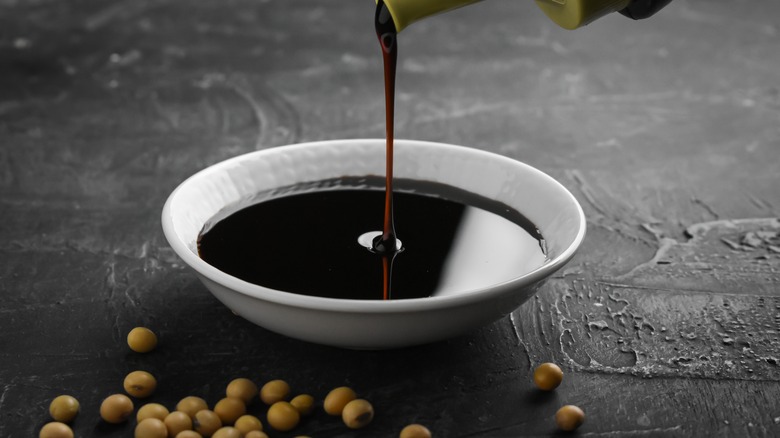The Simple Way To Cut Down The Richness Of Soy Sauce
Imagine that you're preparing a baked salmon dish and you douse the fish generously with soy sauce. Coming out of the oven, the salmon looks and smells great. But when you take a bite, the soy sauce's intensity overwhelms your tastebuds, masking the sweet, delicate flavors of the salmon. You realize immediately, that you need to cut down on the richness. Thankfully, there is a simple way to counterbalance the rich umami flavors by adding another ingredient to temper the soy sauce — rice vinegar.
This ingredient will add acidity, which helps cut through soy sauce's richness and will ultimately create a more balanced taste in your dish. Using an acidic component like rice vinegar to balance strong umami and saltiness is a known and versatile technique in cooking. This condiment perfectly harmonizes with soy sauce since it's subtly sweet and tarty, making it a refreshing counterbalance to soy sauce's robust and rich flavor profile. But let's say you don't have rice vinegar handy. What do you do then?
Other substitutes to neutralize too much soy sauce
While rice vinegar is our pick for tempering soy sauce, there are plenty of alternatives for when you've run out of it or haven't stocked up on it yet. Just think of another ingredient full of acidity, such as in citrus juices like yuzu, calamansi, lemon, and limes. Other types of vinegar like white, balsamic, or apple cider vinegar, can also neutralize soy sauce's natural saltiness. Even acidic juices like pineapple or tomato can work in mellowing the flavor.
Whether enhancing a marinade, a stir-fry, a delicate seafood dish, or fixing your salmon dish, the right choice of acidic ingredient can elevate your food enjoyment. So don't hesitate to experiment with rice vinegar substitutions. Each tangy sauce or citrusy juice will bring a refreshing zest or tang, uniquely ensuring soy sauce will act as a flavor enhancer rather than a dominator, thus contributing to a delicious and well-rounded dish.

